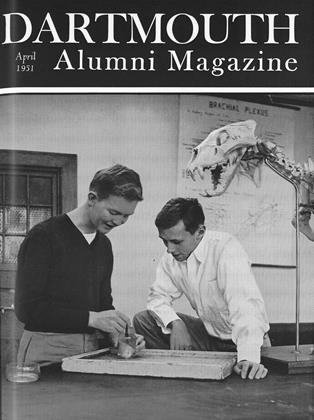by David Riesman,in collaboration withReuel Denney '32 and Nathan Glazer. YaleUniversity Press, 1950.573 pp., $4.00.
The Lonely Crowd is a book that is closely reasoned, provocative, and at times insulated from lay readers like myself by Wordage, terminology, and specialist talk. As the subtitle of the book indicates, The Lonely Crowd is a study of the "changing American character." Postulating three categories of social types: the tradition-directed, the inner-directed, and the other-directed—the predominance of each type has a definite relationship to the population curve of its society—the authors examine contemporary metropolitan America as a society—not necessarily the only society—"in which other-direction is the dominant mode of insuring conformity."
An "other-directed" person is one who is dependent on his contemporaries as his principal "sources of direction"—either those contemporaries "known to him or those with whom he is indirectly acquainted through friends and through the mass media." "All people want and need to be liked by some of the people some of the time," the authors tell us, but the other-directed person's "need for approval and direction from others—and contemporary others rather than ancestors-goes beyond the reasons that lead most people in any era to care very much what others think of them."
The book examines the development of the three character types, analyzes at length the changing social roles of the several agents of character formation, explores the "round of life" of the inner-directed and of the other-directed, applies the theory of character types to American politics, surveys the work and play patterns of the other-directed, and finally inquires what are the chances for autonomy in an other-directed society.
Concerning the last point the authors conclude: "The idea that men are created free and equal is both true and misleading: men are created different; they lose their social freedom and their individual autonomy in seeking to become like each other."
Once the book has shaken itself loose a little from its somewhat forbidding framework and comes to discussing "changes in the agents of character formation" in terms of parents, teachers, contemporaries, and story-tellers; once the talk is concretely of radio, movies, records, comics, books and magazines for children, instead of "mass-media," The LonelyCrowd becomes alive, arresting, at times even fascinating. The evidence touched on by the authors in making their various points ranges from the Alger books to The Hot Rod Magazine, from cookbooks to Mr. Belvedere; it neglects neither Superman nor the rural high school's performance of Aaron Slick of Punkin Crick. And the general thesis is both interesting and disturbing.
Mr. Denney, according to the preface, is responsible especially for the material on the "socializing and escapist function of literature" and for the "treatment of work and play in the contemporary American middle class." His material is among the best in the book.
 View Full Issue
View Full Issue
More From This Issue
-
 Article
ArticleIt All Began in Hanover
April 1951 By FORD H. WHELDEN '25 -
 Article
Article1951 Fund Agents
April 1951 -
 Class Notes
Class Notes1918
April 1951 By ERNEST H. EARLEY, DONALD L. EARR, RICHARD A. HOLTON -
 Class Notes
Class Notes1949
April 1951 By ROBERT H. ZEISER, DAVID S. VOGELS JR., JOHN F. STOCKWELL -
 Class Notes
Class Notes1923
April 1951 By TRUMAN T. METZEL, COLIN C. STEWART 3RD, LEON H. YOUNG JR. -
 Class Notes
Class Notes1911
April 1951 By NATHANIEL G. BURLEIGH, SARGENT F. EATON, MALCOLM G. ROLLINS
KENNETH A. ROBINSON
-
 Article
ArticleMAY 3, 1923
June, 1923 By Frank L. Janeway, Francis J. Neef, William K. Wright, 3 more ... -
 Books
BooksTHE FIRST CENTURY OF AMERICAN LITERATURE
October 1935 By Kenneth A. Robinson -
 Books
BooksBACK WHERE I CAME FROM
April 1939 By Kenneth A. Robinson -
 Books
BooksTHE WHITE STRANGER
May 1940 By Kenneth A. Robinson -
 Books
BooksHOW TO BECOME PRESIDENT
November 1940 By Kenneth A. Robinson -
 Books
BooksTHE TELEPHONE BOOTH INDIAN
May 1942 By Kenneth A. Robinson
Books
-
 Books
BooksShelf life
Nov/Dec 2011 -
 Books
BooksBEAUTY AND HUMAN NATURE: ELEMENTS OF PSYCHOLOGICAL AESTHETICS
October 1935 By A. Myrton Frye -
 Books
BooksMARINE PRODUCTS. OF COMMERCE
MARCH 1930 By B. B. Leavitt -
 Books
BooksERNEST HEMINGWAY: A LIFE STORY
MAY 1969 By JEFFREY HART '51 -
 Books
BooksSKIING FUNDAMENTALS, EQUIPMENT, AND ADVANCED TECHNIQUE
February 1937 By Nathaniel L. Goodrich -
 Books
BooksSELECTED PROSE OF ROBERT FROST.
OCTOBER 1966 By STEARNS MORSE


